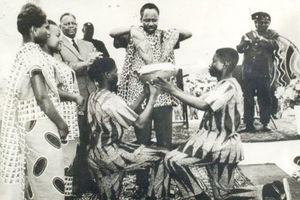Life of women in polygamy: battles of the co-wives

Some of the co-wives. From left: Mariam Simon, Jackline Samuel and Gasaya Daniel at Ngarauni village in Serengeti, Mara region. PHOTO | JONATHAN MUSA
What you need to know:
- Granted, living your whole life sharing your man with another woman isn’t a walk through the park, yet what do you do when you find yourself is such a tricky marriage? Here, three women bare their souls on the ups and downs of a polygamous relationship
Marrying more than one woman is something that doesn’t raise many eyebrows anymore. From religious reasoning, to cultural and traditional, the concept of a man marrying more than one wife is permissible in certain instances; it is what we call a polygamous marriage. We have not resigned ourselves to accepting that polygamy is right, nor are we going to debate its immorality. What we are going to do, is delve into the lives of women living in a polygamous marriage.
Have you ever wondered how life is like for those involved in a polygamous marriage. When one wife has to put up with the existence of a second, and even a third wife? It certainly raises a bit of interest from outsiders trying to decipher the whole idea of sharing a husband.
In Mara region where ‘the Abakuria’ community takes a wide geographical area, men have two, three and even four wives. Men say, “we have wealth, cows – where do we take them, it is better to add another wife.”
Woman paid a visit to Ngarauni village, Serengeti, Mara region where we found an extended family of Mzee Maseke Turuka, 74.
Under the shade of a eucalyptus tree, there were two aged women, practicing weaving. One of the ladies was identified as Sabina, 59, and the other Muruga, 36. Upon reaching closer to them, another voice, sounding much older emanated from the closest house, asking, “Muruga, who is that?”
A quick analysis of the situation made me realise that the women were co-wives, Muruga being the youngest of them.
I became curious to know how Muruga is able to live a presumably amicable life being a second wife.
Seated on a three-wood-legged-curved stool, Muruga starts by revealing that there are many reasons she considered before deciding to be a second wife.
“It is hard to explain straight forward why I chose to be a second wife, but in my case I was raised in an extended family where my dad had seven wives, my mom being the youngest. This gave me a lot of experience and maybe is the major reason why I chose to be married to an old man,” she explains.
She says her late father, who was a pastoralist had a very big herd of livestock and during those days, such kind of possession rendered one rich in the community.
Muruga further discloses that her mother used to be treated like a queen and she got almost all the services that she required, timely. This was among the reasons which made Muruga choose to become a second wife to an old man and do away with her age mates.
Amina Hamisi, 23, a second wife to Hafidhi Issa, 44, in Geita region, says sometimes she enjoys being a second wife but there are times she regrets having made such a decision.
The mother of one puts it clear that not all days are the same. At times she might be in dire need to talk to her husband, but then it happens that that day her husband has to be with his first wife.
“It is not easy sharing a husband. There are many challenges such as getting into arguments with your co-wife over different matters,” she says.
Driven by poverty
Whereas Muruga might have made the decision to become a second wife basing on her past experiences, Josephine Chidawali, 30, in Kishapu, Shinyanga region, she links women deciding to become second wives as a decision prompted by poverty.
“I decided to become a second wife due to poverty, nothing else,” she says.
Chidawali says her mother was suffering from cancer and her father had no means to support with her medical requirements. She, as a result decided to accept becoming a second wife to salvage her family’s situation. Unfortunately both her parents have since passed on.
A research carried by Woman reveals that most first wives do not enjoy their living arrangements, nor are they happy in their marriage.
For instance, Cecilia Biba, 46, a mother of four in Kiseke ward, Nyamagana in Mwanza, says most men forget about their main responsibilities as heads of the family once they marry a second wife.
“When I got married, my husband was as poor as a church mouse, but this never made me think of turning back, considering the position and the life I led back at my home. However, he soon started developing character traits that I had never seen before,” she speaks.
Cecilia says her husband married a second wife purely for his own physical desires and greed. “I have no physical disability that perhaps could’ve prompted his decision, he just decided that he needed a second wife,” she says.
Life as a co-wife wasn’t easy for Cecilia; she started being mistreated by the second wife. Eventually she decided to pack-up and go. She went back to her village because she felt she was no longer needed in the marriage, with her husband showing more affection to the much younger second wife.
The mother of four, who is now a successful business woman, says people are different and have different perceptions. Some will choose to be co-wives while others find themselves in that situation unwillingly.
Polygamy in Africa
Polygamy is a centuries-old practice in Africa that has yet to disappear from modern life. It has both cultural and religious origins. It is legal in 26 out of 54 African countries, particularly Muslim majority countries.
At its core polygamy is natural because men biologically need to spread their seed and it is hard for them to commit to one woman. Right? Wrong.
But this argument is one commonly given to explain the tradition.
For instance, Ghana’s first president, Kwame Nkrumah, wrote in his autobiography that: “However unconventional and unsatisfactory this way of life may appear to those who are confirmed monogamists, and without in any way trying to defend my own sex, it is a frequently accepted fact that man is naturally polygamous.”
And following a law that would protect women in polygamous marriages in Tanzania in the 1970s, males protested saying: “if a man has to get his wife’s consent to a second marriage, the African tradition where man has always been superior to a woman will be endangered.”
Hilda Kato, a Senior State attorney at the Attorney’s Chambers in Dar es Salaam, says in most cases women become second wives due to traditions and cultures.
She adds that there are communities in Africa and some in Tanzania which do not allow a woman to to decide matters of marriage. They arrange everything for her.
“You will find that, a young girl in primary school is discontinued from school and instead is married off to a man more than twice her age as either a first or second wife,” she reveals.
Kato further reveals that some communities do not value the existence of a girl child and hence decide to let her go even without caring on how she will be treated as a second wife.
Vicky Ntetema, a former media personality and activist, says it is a two-way traffic when the issues of second wives come in.
She begins by explaining that, religion has a role to play. Christian religion does not allow a person to be married as a second wife, not unless there is satisfied evidence that the man qualifies to have another wife.
Vicky concludes that there are women who accept to be second wives after going through divorce, though this never goes smoothly due to the scar and origin of her divorce.
Mwanaisha Idd, a business woman in Mwanza city who is a Muslim by religion, says though her religion allows second wives, men have now taken it as an advantage.
“In the past, before marrying a second wife a man would first seek consultation from his first wife through dialogue, but that has since changed and now men do as they please without any remorse,” she says.
Erastus Macha 62, a psychologist based in Mwanza city says being a second wife is like learning to perfect a set of aerial maneuvers. There are seriously complicated stunts involved, and there remains a slight sense of imbalance.
Relationships between two women sharing a husband are seldom amicable, there’s always an underlying sense of bitterness and jealousy that surrounds the relationship.
“During my final two years in my first marriage, I was constantly telling my friends how I wanted to make my relationship work. Then I learned that marriages aren’t like cars, independent of the people in them, to be fixed according to its manual book,” he says.
The fact is most second wives live in fear, stress and psychological torture, however, there are those who enjoy the arrangement of a polygamous marriage, those who live in harmony with their co-wives.




